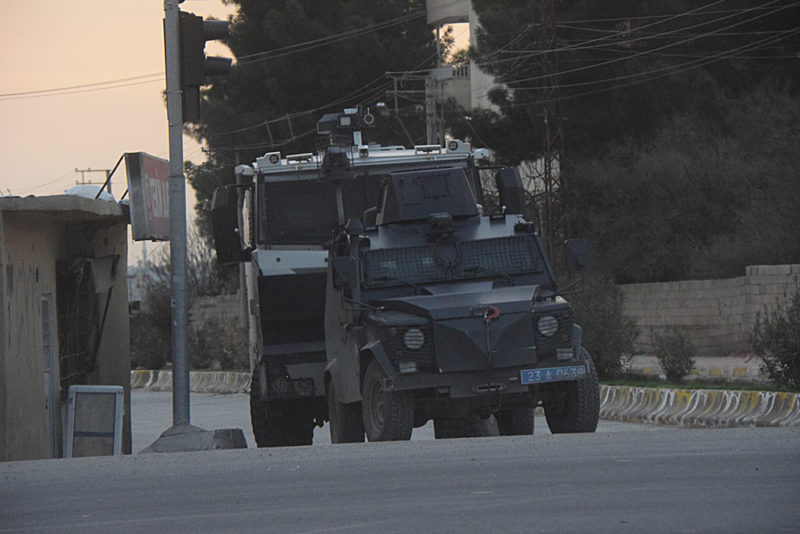 Mehmet Perinçek is a Turkish historian, political scientist, and professor at Istanbul University. In an interview with FWM, he explains Turkey's u-turn concerning the EU and Russia. Photo: Private
Mehmet Perinçek is a Turkish historian, political scientist, and professor at Istanbul University. In an interview with FWM, he explains Turkey's u-turn concerning the EU and Russia. Photo: Private
Turkey gives up EU dreams and turns east
After fifty years of fruitless waiting, Turkey found itself as far from the accession to the “European family of nations” as ever. Starting to drop the idea, Turkey is now turning eastwards towards Russia, restoring the severed ties and eyeing a membership in the Shanghai Cooperation Organization or BRICS. The South Stream project has been revived. The Istanbul professor Mehmet Perinçek explains the logic behind Ankara’s reconciliation, its view on the Syrian war, as well as the coup attempt last July.
Published: November 30, 2016, 2:22 pm
On October 10, the leaders of Russia and Turkey signed an agreement to complete the construction of South Stream, which was put on hold following the downing of a Russian bomber on mission against terrorists in Syria. On November 23, a high-ranking Turkish delegation visited Crimea, de facto recognising Russia’s sovereignty over the peninsula. This was possibly after Turkish president Recep Erdogan apologised for the downing and put the blame on American agents in Turkey. This marks a decisive shift in Turkey’s focus eastwards, away from the West.
Turkey signed the Agreement of Association with the European Economic Community (the predecessor of the EU) as early as in 1963. The results have however been slim. On November 9 this year, the European Commission published a yearly report in regard to the progress of Turkey’s Euro-integration, which criticised the poor state of freedom of speech and human rights in the country and the inadequacy of the attempts to bring the Turkish legal system in accordance with European norms. Martin Schulz, the President of the European Parliament, even threatened Ankara with economic sanctions for the detention of opposition politicians and journalists. President Recep Erdogan in his turn slammed the EU for its support of the Labour party of Kurdistan, banned in Turkey, and announced the prospect of a referendum on the issue of the country’s accession to the EU.
Moreover, the Turkish leader named a fair chance at Shanghai Cooperation Organization (SCO) membership among the alternatives to joining the EU: “Brexit can spread; such voices are heard from France, Italy. Under these circumstances, Turkey should stay calm. One should not say that the European Union is the only option. Why couldn’t Turkey become a member of the SCO? I talked about it with [Russian president Vladimir] Putin and [President of Kazakhstan Nursultan] Nazarbayev. Turkey’s participation in the SCO will give us more freedom of action in this regard,” Erdogan told Turkish reporters after his official visit to Uzbekistan as quoted by the Sabah newspaper on November 19. The SCO comprises Russia, China and four other countries.
Meanwhile, the European Parliament adopted a Resolution on November 24, recommending a stay of the discussion on Turkey’s accession to the EU, owing to the inacceptable domestic policy of the authorities.
However, in Turkey about 56 per cent of those polled still think that the country needs EU membership. As far as alternatives are concerned, 23 per cent consider the prospect of SOC membership plausible, and 18 per cent favour BRICS membership. On the other hand, 22 per cent of the citizens are in favour of a non-aligned policy.
While Turkish-European relations are worsening, the relationship with Russia is improving. “Russia becomes a ‘friend’ again”, the Turkish newspaper Milliyet remarks, having said that “a group of friendship with Russia” was formed in the Turkish Parliament on November 19. And on November 23 a delegation of Turkish MPs, politicians and businessmen arrived at Crimea, led by the Head of the Association of Eurasian Governments Hasan Cengis. He announced the arrival of a Turkish governmental delegation of the highest level to Crimea in the near future and promised that Ankara would soon drop the anti-Russian sanctions: “Turkey re-establishes its foreign policy and sets off on the road to the Eurasian family. We consider that Turkey’s alignment with the Eurasian family is impossible without dropping the anti-Russian sanctions. The policy of the Turkish government aims at altering its stance on the Crimean issue.”
“There is no future for Turkey in the EU”
We met the Turkish historian and political scientist Mehmet Perinçek, professor at Istanbul University, in Istanbul to hear his view. According to him, the path to the European Union is blocked.
– Turkey’s accession to the EU is a big hoax. Turkey’s future lies not in the West, but in Eurasia. If Turkey wants to preserve its territorial integrity, it must cooperate with Eurasian countries, and it must become a part of Eurasia, not only out of security considerations, but also in order to develop economically, to provide for stability of the region. Russia, China and Iran should be Turkey’s key partners. Thus, I see Turkey’s future not in the West, not in the EU, but in Eurasia.
Turkey’s accession to the EU is a big hoax.
Turkey no longer takes offence from the stance of EU politicians, he says.
– If Turkey drops the idea, Turkish-European relations will improve greatly. Giving up the process will please both Europe and Turkey.
The reason why it is unrealistic to join the EU, Perinçek explains, consists of both cultural differences – Turkey being a Muslim country – and political issues.
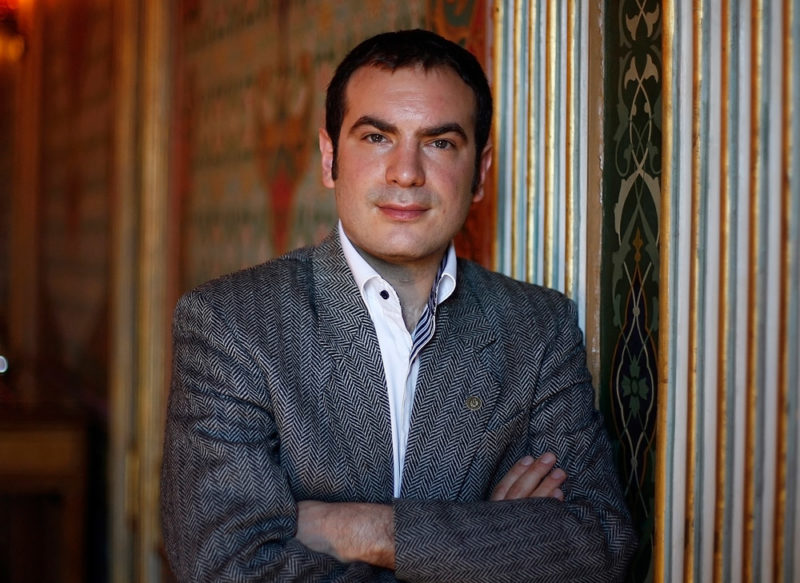
Mehmet Bora Perinçek (born September 19, 1978) is a Turkish historian, political scientist, and professor at Istanbul University. He also studied in Nizhny Novgorod in Russia. His PhD thesis was on Turkish-Soviet military relationships in the Eastern Front from the Russian archives: 1919-1922. His books were also published in Russian, German, Persian and Azeri Turkish. Dr. Perinçek frequently gives lectures at international symposia and appears on international TV programs. He is fluent in Turkish, Russian, German and English and also translates poetry and literary works from Russian to Turkish. Perinçek’s father, Doğu Perinçek, who is the leader of the Patriotic Party, a Kemalist Nationalist party, was sentenced to life imprisonment in August 2013 in the case of the terrorist organization Ergenekon, but was released in March 2014. Photo: Private
– The European Union is an imperialist union of European states, and Turkish membership inhibits their movement. That is why they do not want us. The accession of Turkey was an American project. Americans wanted to push us through the European gate in order for Turkey to be close to the West and not side with Eurasia. So, we waited at the doorstep of the EU. A year passed, two years, then five years passed, then decades passed, and it became clear that the plan has failed. America also wanted to disadvantage European countries, to weaken the EU by Turkey’s accession. Thus, the Euro-integration of Turkey has two aspects. On the one hand, the USA kept Turkey waiting at the EU doorstep and controlled it, and, on the other hand, it did not want a strong EU that could compete with Washington.
FWM: There is an opinion that a certain Islamization of Turkey is taking place under Erdogan, that Islam is acquiring a fundamentalist character here, more fundamentalist, than, say, in Syria, or Islam under Kemal Atatürk, the founder of modern Turkey. Is there a tendency of Islamization of the secular society, the state structure?
– There is such a problem, true. Under Erdogan Turkey is undergoing visible Islamization, and it risks losing its Kemalist roots, its secular-state character. Nevertheless, in the aftermath of the coup, the Turkish society realized that such a trend endangers security, because cults are destructive. Turkey needs to remain a secular state not only to be united, but also to be secure.
If the EU did not support armed opposition in Syria, they wouldn’t have faced the refugee problem.
FWM: Erdogan’s ability to control the influx of refugees from Syria, Iraq and probably, Afghanistan, was discussed during the negotiations with European countries. Is he able to, so to say, blackmail the EU by releasing bigger masses of refugees headed for Europe?
– You know, this is the consequence of the hypocritical European policy in the Middle East. If they did not try to oust Assad, did not support armed opposition in Syria, they wouldn’t have faced the refugee problem. When we fail to see the roots of the problem, we won’t be able to solve it.
Reconciliation between Turkey and Russia
It has however not been easy to turn away from the EU. The relations eastward had been deeply severed a year ago, when a Turkish F-16 fighter jet on November 24, 2015 shot down a Russian bomber on mission against Islamists over Syria. Both the pilot and the weapons officer ejected, but while the latter was rescued, the pilot was shot dead by pro-Turkish militants in Syria. Turkey claims that the aircraft violated Turkish airspace for 17 seconds, which Russia denies. However Perinçek states that the downing was not ordered by Ankara, and sees a foreign involvement in the incident with the intent to alienate Turkey from Russia, particularly the Gülen movement.
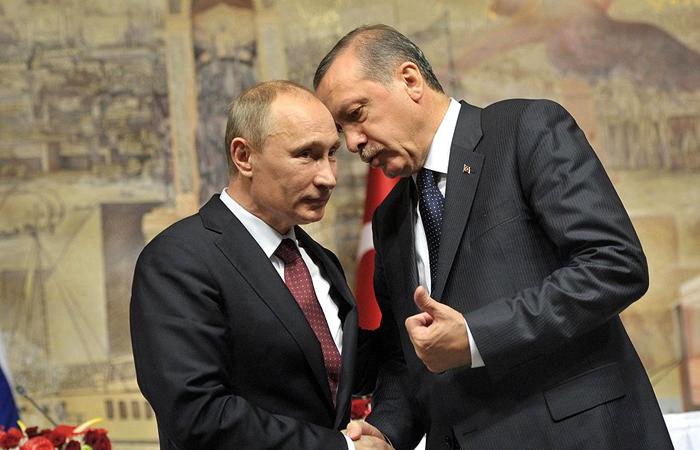
Russia’s President Vladimir Putin (left) and Turkey’s President Recep Erdogan mend ties. Photo: Kremlin
The preacher Fethullah Gülen is a former ally to president Erdogan. Both have been accused of being Islamists, Erdogan was jailed for this reason in 1997 and Gülen moved to the US in 1999. The friends however became bitter enemies in 2013 after Gülen sympathisers were accused of corruption.
American agents associated with Fethullah Gülen shot down the Russian plane.
– The West in its planning had always counted on a conflict between Russia and Turkey. Whenever Russia and Turkey fight, it always benefits the West. It helps the West to implement its plans for our region, the Middle East, in the Caucasus, etc. On the contrary, when Turkey cooperates with Russia, it always benefits both Russia and Turkey; hence, they can achieve their national goals. The incident with the bomber is a good example of the US intention to set Russia at loggerheads with Turkey in order to implement their projects in our region. They used Fethullah’s agents in the Turkish Army and in the government. The Turkish president was unaware of this operation, thus, we see an American trail in this incident. After the coup attempt it was found out that the pilots, who downed the Russian bomber, were Fethullah’s supporters, Perinçek explains.
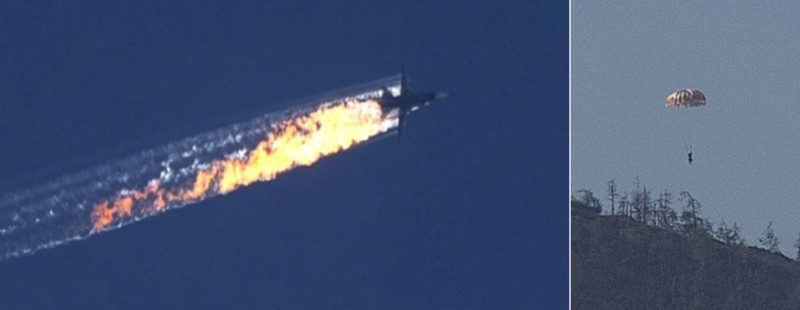
The Russian Sukhoi Su-24 bomber burst into flames when hit by a missile from the Turkish F-16 fighter jet on November 24, 2015. Both crew ejected, but while the weapons officer was rescued by Russian troops, the pilot was killed by Turkish-backed militants. Photo: Unknown
Russia’s President Vladimir Putin was furious over the incident and called it a “stab in the back administered by the accomplices of terrorists”. Erdogan refused to apologize for months, resulting in an extensive boycott from Russia.
According to Perinçek, Erdogan eventually realised that it was a plot against him, and apologized. In a letter to Putin in June 2016, he wrote that Ankara had no intention of downing the Russian plane and shared the pain of the pilot’s family.
– It was absolutely an apology, a true apology, as the Minister of Foreign Affairs and later the President of Turkey both once again told the media that they apologized, said Perinçek.
“The coup attempt was an American operation”
Concerning the coup attempt itself on July 15, 2016, there have been many theories, some claiming that the whole scenario was staged by Erdogan himself in order to get rid of the opposition, since it was rather erratic, disorganized. Perinçek does not agree.
– It was not a false flag operation, it was an attempt at a coup carried out by pro-American forces and organized by Washington against Turkey. Gülen is hundred per cent an American agent, his organization is an operational unit of the CIA and Washington in our region. Nevertheless, the majority of Turkish officers were against the coup, and that was why it failed. Owing to the Kemalists, to the patriotic military, the attempt was abortive.
The pipeline project called the Turkish Stream is particularly important geopolitically, a plan to carry natural gas from Russia to Turkey and beyond to markets in southern Europe. It was decided upon after the planned South Stream pipeline through Bulgaria was abandoned due to EU sanctions. After the downing of the Russian bomber, the Turkish Stream was frozen, but on October 10, 2016, the leaders of Russia and Turkey signed an agreement to resume the construction. The rapid reconciliation, which came as a surprise to many people, underscores its importance to both countries.
– The Turkish Stream is not a routine affair like housing construction or tourist business – it is a strategic project that connects Turkey and Russia, strengthening their ties. Thus, after the coup Russia became aware of the conflict between Turkey and the USA, and the reconciliation process began.
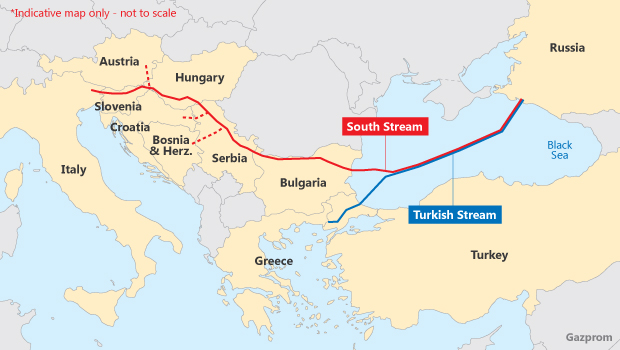
The Turkish Stream natural gas pipe-line will replace the South Stream that was scrapped due to EU sanctions.
“With Trump, Fethullah loses support”
Turkey, being a NATO member, hosts an important American air base at Incirlik, where there are reportedly also nuclear weapons. After the coup attempt, Turkish forces blocked the base, arrested the highest Turkish officer at the base and his staff, and effectively held the American personnel stationed there hostage.
– The American Incirlik air base is not only a threat to Russia and Iran; it is also a great threat toTurkey, because during the coup attempt the agents of Fethullah used the base as their headquarters. Besides, with the help of this base Americans support Kurdish separatists. I view the Incirlik base as a factor undermining Turkish security, and I think that Turkey should close this base.
The election of Donald Trump is a relief for Turkey, Perinçek explains, although it will impact other countries more.
– All pro-American elements in Turkey are unhappy, but all the patriotic forces are glad. Of course, American policy will not change radically, but it will become more temperate. The main alteration of the course will be in regard to China and Germany. Trump is not interested in conflicts between Russia and the USA, between Washington and Ankara. On the contrary, Hillary Clinton’s arrival would have been fraught with great problems for Turkey, because she planned to strongly support Kurdish separatists and Fethullah’s supporters in Turkey.
All rights reserved. You have permission to quote freely from the articles provided that the source (www.freewestmedia.com) is given. Photos may not be used without our consent.
Consider donating to support our work
Help us to produce more articles like this. FreeWestMedia is depending on donations from our readers to keep going. With your help, we expose the mainstream fake news agenda.
Keep your language polite. Readers from many different countries visit and contribute to Free West Media and we must therefore obey the rules in, for example, Germany. Illegal content will be deleted.
If you have been approved to post comments without preview from FWM, you are responsible for violations of any law. This means that FWM may be forced to cooperate with authorities in a possible crime investigation.
If your comments are subject to preview by FWM, please be patient. We continually review comments but depending on the time of day it can take up to several hours before your comment is reviewed.
We reserve the right to delete comments that are offensive, contain slander or foul language, or are irrelevant to the discussion.

NOAA Predicts Zero Sunspots for Almost the Whole 2030s
CLIMATEThe United States' government scientific organization, the National Oceanic and Atmospheric Administration (NOAA), predicts zero sunspots from 2031 to 2040. This is an extreme situation that has not occurred in as long as humanity has been counting sunspots, and it leads us into uncharted territory in terms of our solar system. However, this prediction aligns with the warnings of the world-renowned solar researcher Valentina Zharkova for many years, who indicated in 2019 various signs of this catastrophic phenomenon, including the extreme hailstorms we have seen in Europe and the world this summer. The forecast and various observations this year give cause for very significant concern. In this unique analysis, Free West Media explains why.

European Nationalist Parties Forge Cooperation Ahead of EU Elections
EUROPEAN ELECTIONSOn Saturday, August 26, representatives of six European nationalist parties gathered in Budapest. The meeting was initiated by the Hungarian party Mi Hazánk and took place in the national parliament. Representatives of the parties signed a joint declaration that not only reaffirms the parties' friendship but also their unity on a range of complex political issues. A surprisingly clear and radical manifesto was established. The hope is that this cooperation will lead to success in the EU elections and eventually result in the formation of a group in the European Parliament. For Swedish nationalism, this meeting marks a success as Sweden, for the first time, has a party represented in a leading nationalist cooperation in Europe. Free West Media was present at this historic event.

Turkey Believes Sweden Hasn’t Done Enough
Sweden will have to wait a bit longer for NATO membership, according to Turkey's Justice Minister Jilmaz Tunc. First, Sweden must extradite the "terrorists" Turkey wants and stop the desecration of the Quran.

Swedish Weapon Takes Down Russia’s Best Attack Helicopter
The Russian attack helicopter Ka-52 is considered one of the world's best and has struck fear in Ukraine, where it has hunted down tanks and other armored vehicles, often beyond the range of many light anti-aircraft systems. However, it has met its match in the Swedish air defense missile system RBS 70, which has quickly led to significant losses for the Russian helicopter forces.

Strong Confidence in German AfD
Alternative for Germany (AfD) held a party conference on July 29-30 to select candidates for the upcoming EU election next year. EU Parliament member Maximilian Krah, belonging to the party's more radical, ethnonationalist faction, was appointed as the top candidate. The party's two spokespersons delivered powerful speeches criticizing the EU's failed migration policy and trade sanctions that isolate Europe and Germany from the rest of the world. They argued that it's time for the EU to return a significant portion of its power to national parliaments. However, they have dropped the demand for Germany to exit the EU.

The Establishment Wants to Ban Germany’s Second Largest Party – for the Sake of Democracy
The rising popularity of AfD has raised strong concerns within the establishment. Despite lies and demonization in the media and isolation from the overall political establishment, the party continues to grow. Certain representatives of the party are accused of becoming increasingly "extreme," and in an unusual move, the influential weekly newspaper Der Spiegel demanded that AfD be "banned."

Dutch FvD break through the media blockade
What is happening in the Netherlands? It is often difficult to follow events in other countries, especially when distorted by system media. We give Forum for Democracy (FvD) the opportunity to speak out on the political situation in the Netherlands and the staunch resistance they face in trying to save the country.

The Ursula von der Leyen Affair
After a criminal complaint in Belgium against the President of the European Commission, the so-called SMS-case, now takes a new turn. The judge responsible for the investigation will likely gain access to the secret messages exchanged between Ursula von der Leyen and Albert Bourla, CEO of Pfizer, at least if they haven't been deleted.

Publisher of Unique Literature Worldwide Blocked by International Distributor
Arktos has distinguished itself by publishing groundbreaking philosophers and social critics. Now, the publisher's international distributor has abruptly terminated the cooperation, and more than 400 already printed titles cannot reach their audience. There is strong evidence that the distributor has been under pressure, something that has also happened in Sweden. We have spoken with Arktos founder Daniel Friberg about the ongoing struggle for freedom of speech in a shrinking cultural corridor.

Care prompts bishops to criticize transgender ideology
The Catholic bishops of the Scandinavian countries presented an open five-page letter criticizing transgender ideology on March 21, just before Easter. The document primarily expresses care and advice and was read aloud in Catholic churches in Sweden, Norway, Finland, Denmark, and Iceland. Cardinal Anders Arborelius, Bishop of Stockholm, is one of the signatories of the document.





